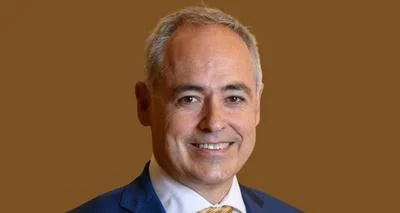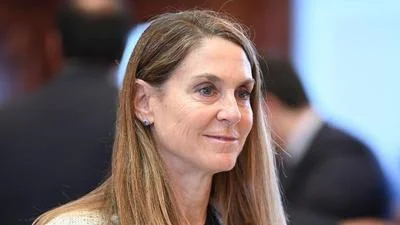The Independent Map Amendment is a government initiative that would take the job of drawing maps away from politicians and give it to the people, according to Jillian Bernas, the Republican who is running to represent the 56th District of Illinois in the General Assembly.
“The district maps as currently drawn have been worked to guarantee a certain outcome in most districts, which means many seats go uncontested and the voters do not have a choice,” Bernas recently told the Chicago Sun-Times in a candidate questionnaire. “I believe that competitive elections produce more responsive candidates because these community leaders need to earn your vote and are less likely to take it for granted.”
Currently, she said, the most important criteria for drawing maps are the voting history of constituents and the address of the incumbent, both of which should and would change under the proposed citizen-initiated amendment on redistricting, known as the Independent Map Amendment.
Gov. Bruce Rauner has called on members of the Illinois General Assembly to return for the fall veto session prepared to start working on creating independently drawn legislative maps following the Illinois Supreme Court’s grant of the motion for a direct appeal of a Cook County Circuit Court judge’s July 20 ruling against the so-called fair maps ballot proposal, which has the support of nearly 600,000 Illinois citizens and bipartisan support in the General Assembly.
“Under the amendment, a panel of 11 members would respect the social, racial and geographic boundaries of the community rather than placing voters into predictable Republican and Democrat districts,” Bernas said.
In November, the Schaumburg resident is challenging Democratic incumbent state Rep. Michelle Mussman.
“Sadly, my opponent has not and cannot stand up to the House Speaker (Michael Madigan) since her district was drawn by the speaker, her campaign is funded by the speaker and her salary is augmented by the speaker, having appointed her to head the special needs committee,” Bernas said.
Reforms also are needed regarding how to fund education in the state, according to Bernas, a former teacher who has a master’s degree in education with a specialty in ESL instruction from the University of Notre Dame and who also holds master's degrees in public policy from the University of Chicago and the University of Chile.
“Education is an investment in our children and young people and provides a great benefit to the overall society,” she said. “Families should have access to an education that is equitable, effective and strives for excellence. Unfortunately, this is not happening in the current structure of government. We are investing in bureaucracies instead of investing in children.”
Specifically, Bernas said reforms in funding should have education dollars follow children instead of bureaucracies. This would empower parents and allow them to do what is best for the student, as well.
“Although this change will not reduce the state’s investment in education right away, it will change the flow of resources and who makes the decisions on how taxpayer resources are spent on K-12 education,” she said.
At the same time, state support for public higher education has declined for two decades, requiring that a plan be made to restore Illinois’ leadership in public higher education. Bernas thinks that funding Illinois’ universities is critical to the state’s future and should be a legislative priority.
“State universities should be a vehicle for upward mobility,” she said. “Instead, as a result of the mismanagement of state funds, public universities are seeing their costs rise because of problems plaguing the state. In order to restore Illinois as a leader in higher education, we need to restore our state’s fiscal solvency by making the politically difficult decisions needed to reform our state.”
This is especially important when it comes to the state’s taxes and budget, Bernas said.
“Illinois is in a very precarious position given its massive state debt and crushing pension debt,” she said. “This puts our state in a weak position to provide the programs and services that are necessary for our most vulnerable citizens.”
Right now, Bernas said little evidence exists to show that the General Assembly is able to balance the budget just by raising taxes, an action that she would consider only after structural reforms had been made to the state’s failing systems.
“We cannot continue to pass along the cost of poor policy decisions to families and businesses … and expect better outcomes,” she said. “Only by reforming our failing systems can we provide the economic growth that leads to an improved quality of life for families, better opportunities for job seekers and higher tax revenues for government.”
And once such structural reforms were accomplished, there would be certain steps that state lawmakers could take to balance the budget.
“When individuals, families and businesses need to pay down their debt, they look for efficiencies, cost-savings measures and make the hard decisions to give up certain expenditures in exchange for paying down their debt,” Bernas said. “They may also seek out opportunities to increase their revenue by acquiring more advanced skills or taking on extra hours.”
Additionally, the issue of pensions must be addressed, she said, particularly when one-quarter of every dollar Illinois takes in goes to fund pensions. Furthermore, the unfunded pension liability in the state is the largest in the nation -- $111 billion and growing.
“We are not going to be able to provide for the pensions by just taxing, borrowing or investing,” Bernas said. “Reforms to the pension system are a needed piece of the puzzle because if left unreformed and underfunded, the pension system will consume the state budget.”
While protecting benefits that already have been earned, the constitutionality of moving all current public employees to self-managed plans must be tested, she added.
“I am behind reforms that transition government employees away from defined benefits toward a 401(k)-style plan similar to those in the private sector,” Bernas said. “This move is critical to improving state finances and puts more control in the hands of retirees instead of politicians.”






 Alerts Sign-up
Alerts Sign-up